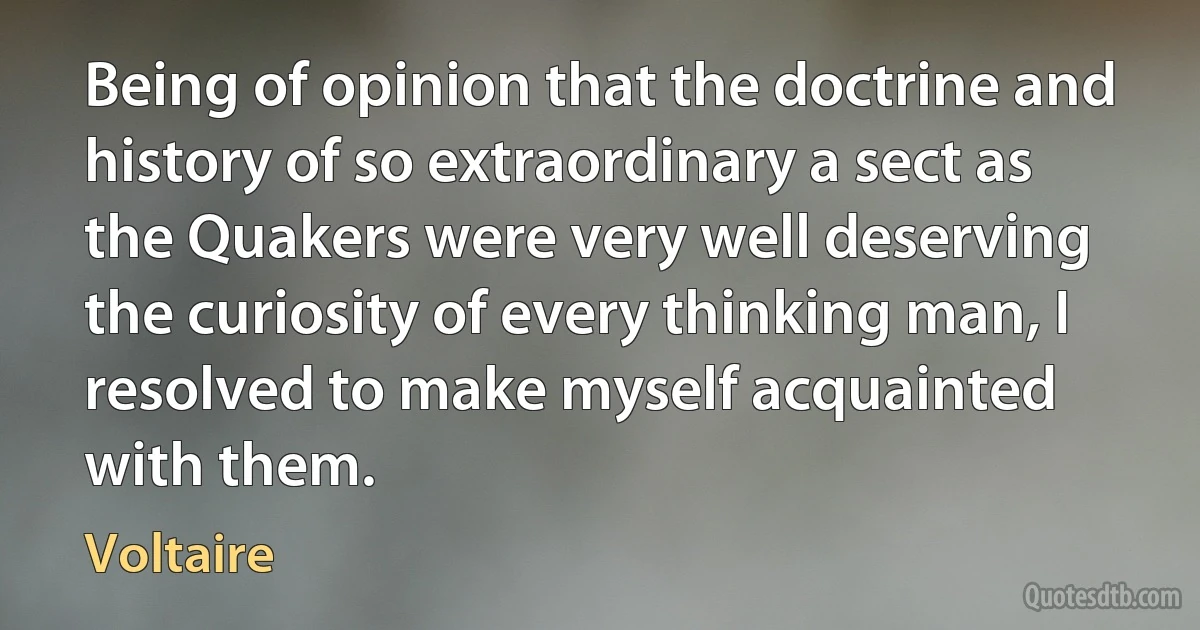Quakers Quotes - page 2
William Penn, when only fifteen years of age, chanced to meet a Quaker in Oxford, where he was then following his studies. This Quaker made a proselyte of him; and our young man, being naturally sprightly and eloquent, having a very winning aspect and engaging carriage, soon gained over some of his companions and intimates, and in a short time formed a society of young Quakers, who met at his house; so that at the age of sixteen he found himself at the head of a sect. Having left college, at his return home to the vice-admiral, his father, instead of kneeling to ask his blessing, as is the custom with the English, he went up to him with his hat on, and accosted him thus: "Friend, I am glad to see thee in good health."

Voltaire
The Puritans had accused the Quakers of "troubling the world by preaching peace to it." They refused to pay church taxes; they refused to bear arms; they refused to swear allegiance to any government. (In so doing they were direct actionists, what we may call negative direct actionists.) So the Puritans, being political actionists, passed laws to keep them out, to deport, to fine, to imprison, to mutilate, and finally, to hang them. And the Quakers just kept on coming (which was positive direct action); and history records that after the hanging of four Quakers, and the flogging of Margaret Brewster at the cart's tail through the streets of Boston, "the Puritans gave up trying to silence the new missionaries"; that "Quaker persistence and Quaker non-resistance had won the day."

Voltairine de Cleyre
Who sold white Quaker children into slavery? Protestants. Who cut out the tongues of Quakers? Who burned and destroyed men and women and children charged with impossible crimes? Protestants. The Protestants have persecuted exactly to the extent of their power. The Catholics have done the same.

Robert G. Ingersoll
Then the Quakers, five in number. Never was there such a rout. They had absolutely nothing to say. Every charge against Penn came out as clear as any case at the Old Bailey. They had nothing to urge but what was true enough, that he looked worse in my History than he would have looked on a general survey of his whole life. But that is not my fault. I wrote the History of four years during which he was exposed to great temptations; during which he was the favourite of a bad king, and an active solicitor in a most corrupt court. His character was injured by his associations. Ten years before, or ten years later, he would have made a much better figure. But was I to begin my book ten years earlier or ten years later for William Penn's sake? The Quakers were extremely civil. So was I. They complimented me on my courtesy and candour.

Thomas Babington Macaulay
In these frequent talks about the books I read, he used, as opportunity offered, to give me explanations and ideas respecting civilization, government, morality, mental cultivation, which he required me afterwards to restate to him in my own words. He also made me read, and give him a verbal account of, many books which would not have interested me sufficiently to induce me to read them of myself: among others, Millar's Historical View of the English Government, a book of great merit for its time, and which he highly valued; Mosheim's Ecclesiastical History, McCrie's Life of John Knox, and even Sewel's and Rutty's Histories of the Quakers. He was fond of putting into my hands books which exhibited men of energy and resource in unusual circumstances, struggling against difficulties and overcoming them: of such works I remember Beaver's African Memoranda, and Collins's account of the first settlement of New South Wales.

John Stuart Mill

